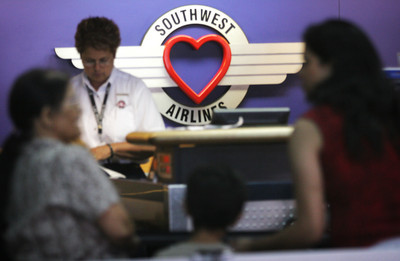Southwest steps up service

The most prominent airline at McCarran International Airport won’t be following other carriers that have made drastic cuts to Las Vegas flights.
On Thursday, Southwest Airlines, which is responsible for about 30 percent of scheduled service to Las Vegas, announced a new winter schedule with no significant cutbacks.
The news comes as several domestic airlines, struggling to stay afloat as fuel costs outpace revenue, are making dramatic cuts to the number of available seats into Las Vegas.
In contrast, Southwest’s new schedule has the carrier going from 240 to 238 daily departures beginning Nov. 2, a difference of less than 1 percent.
The cuts include one route each to Chicago, Orange County, Calif., and Phoenix and two routes to Oakland, Calif. Each one of those cities has several daily departures, led by Phoenix, which will still have 16 daily connections with Las Vegas. Southwest will also add a new route from Fort Lauderdale, Fla., and two to Denver.
It’s a touch of good news for resorts and other businesses that depend on frequent, affordable and available airline seats to Las Vegas, which by the end of the year will be down at least 12 percent compared to last year.
“Unlike almost every other domestic U.S. airline, Southwest is not shrinking,” Bill Owen, the airline’s lead schedule planner, wrote in a blog entry about the winter schedule. “We are not abandoning cities.”
Nationally, the new Southwest schedule cuts 31 routes and adds 40.
The most aggressive push was in Denver, home of limping, low-fare competitor Frontier, which filed for bankruptcy in April but remains in service.
Owen said Southwest is pursuing new Denver service because the Rocky Mountain city is centrally located for service to Western, Southwestern and Midwestern markets.
“Denver is just a great transportation Mecca,” he said.
Southwest moved into Denver in January 2006 and by the end of this year will have 115 daily departures, the quickest service ramp-up for a city in the history of the airline.
The decision by Southwest to grow despite economic problems crippling much of its industry is a sign the airline has a strategy of “going for the jugular” when it has a chance to grab business at competitors’ expense, management expert Walter Ferrier told the Wall Street Journal.
Ferrier, a professor at the University of Kentucky, told the paper “our research shows they have every incentive to fight off the little guys.”
There is probably no better time than the present for Southwest to assert its muscle in the airline industry.
High fuel prices have prompted massive layoffs and pullbacks by airlines from Milwaukee to Phoenix and every place in between.
Most damaging to Las Vegas has been the troubles of Arizona-based US Airways, the second most prominent airline in Southern Nevada after Southwest. By the end of the year, US Airways will have 48 percent fewer flights to McCarran than it did in 2007.
And US Airways President Scott Kirby recently told an audience at the Las Vegas Convention Center that cuts could go even deeper.
“At least half of the capacity reductions aren’t in the system yet,” Kirby said Monday.
Southwest has managed to stay ahead of the industry problems largely by purchasing fuel in bulk years ago when prices were lower.
Today, with oil prices topping $140 per barrel, Southwest is getting 70 percent of its fuel for $51 per barrel. Next year it will get 55 percent of its fuel for $51.
Fuel deals alone saved the airline $727 million last year.
As a result, according to the Wall Street Journal, Southwest boosted passenger counts nationally nearly 8 percent this year in contrast to airlines such as United and Northwest which lost passengers at rates of 8.5 and 6.6 percent, respectively.
That said, even Southwest will eventually have to pony up for higher-priced oil.
By 2012, when Las Vegas will need 6.4 million more visitors annually to maintain today’s hotel occupancy rates, Southwest’s cheap fuel stockpile will represent just 15 percent of its supply.
If the airline were to falter, it would be bad news for Las Vegas, considering its large presence at McCarran.
“They might be better for us in the short-term,” Randall Walker, director of the Clark County Department of Aviation, said earlier this week. “But I think we have to worry about this going forward.”
Contact reporter Benjamin Spillman at bspillman@reviewjournal.com or 702-477-3861.